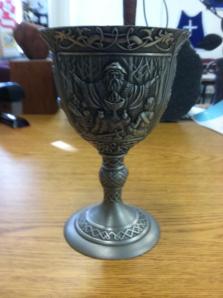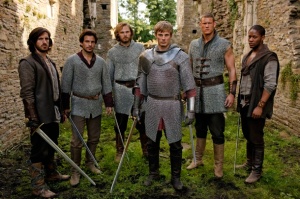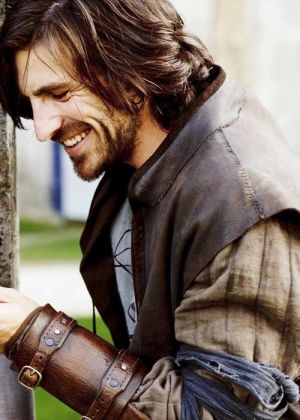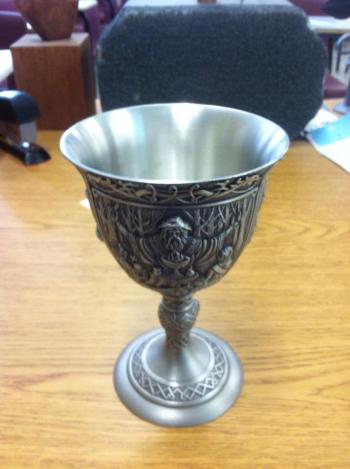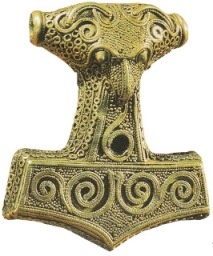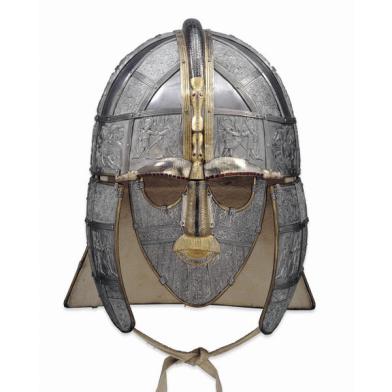This week, someone stole into my classroom either before or after hours and left this beauty on my desk. I came in, unlocked the door, and there it was. My students are calling it the Holy Grail because we recently studied Arthur and the room is already a place of myth and legend. (I mean, I may have just knighted one of my students for a picture in the school yearbook…)
The goblet depicts Merlin (I assume you’re familiar if you’re on this blog) in three scenes: one with Arthur in the woods tutoring the Once and Future King, one in his study (which looks like an alchemist’s paradise), and one at Stonehenge. Having no divination powers of my own, I Googled the item’s make and model. This particular cup hasn’t been made in a couple of decades, though I did see it for auction.
There is also a curious phrase etched into the metal at the bottom of the cup, which I was unable to discern using a magnifying glass.
So I have myself a mystery. Even more so because no one has taken credit for the gift.
It’s possible that the goblet was given to me years ago and languished in a cabinet for some time, and that someone rifled through my room and simply placed the cup dead center on my desk. There is, after all, something familiar about it. But it couldn’t have come from the cabinet under my TV or the back cabinets, where most of my oddities are kept, because I was just in there digging through reference materials to help my kids with NaNoWriMo.
Curiouser and curiouser.
From there, the coincidences take a further turn for the strange. My daughters and I just finished watching the BBC series, Merlin, which we thoroughly enjoyed despite its many departures from lore due to being marketed as a family friendly retelling. (Which, for the most part, it was. Except for my mental commentary regarding Katie McGrath as Morgana…)
Sure, there were some weird British comedy moments, and Merlin as a Dragonlord would have benefited from playing a little Skyrim, but overall, it was far better than I expected it to be. It didn’t hurt that Lancelot got the short end of the stick (finally!) and that the writers of the show seem to appreciate Gawain about as much as I do. In my not so humble opinion, Merlin was cancelled much earlier than it should have been. The world needs more of this:
And this…
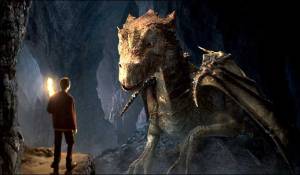
Merlin: Great Dragon, you’re the best psychiatrist ever! Except when you baldfacedly lie…
GD: Ah, but young warlock, I am a dragon! I cannot grow a beard…
And maybe a little more Katie…
Here, ladies, I’ll toss you a bone too…
Just 5 seasons, BBC? You suck. But I digress…
On top of all that, my latest passes at teaching T.S. Eliot’s “The Waste Land” (which kind of got swept under the rug) and Le Morte d’Arthur left me fixated on the tale of the Fisher King and Arthur’s languishing in a similar stasis after Camelot is broken by Lancelot and Guinevere’s affair. The idea of Arthur, with whom I’ve always identified (but especially in times of adversity), needing a powerful relic like the Holy Grail (ironically a female symbol) in order to be reborn has definitely occupied my thoughts of late. And I’ve kept that to myself–which is kind of a big deal for me.
Yet here the chalice sits:
What do you do when someone breaks into your classroom and puts a goblet on your desk? Even if you’re me, you still consider things like poisoning, and you send missives (re: Facebook shout outs) to the universe inquiring as to who might be responsible for this. I lasted until about fourth hour laboring under such logic, which–again–is kind of big deal for me.
Then I filled the Holy Grail with Monster (hey, it’s me!) and pounded it. Am I reborn and the land with me? Well, I’ll let you know if it starts raining blossoms in Arizona.
I still don’t have any real answers to this mystery, but sometimes it isn’t answers we seek–merely a path forward. (Although I’d still like to know why the hell BBC cancelled Merlin! I’m suffering through Winx Club with my kids right now!)
To whoever put the goblet on my desk, thank you. At the very least, I look pretty legit drinking from it while lecturing on Shakespeare. And, if you are an assassin, you now know that I’m immune to iocane powder.

